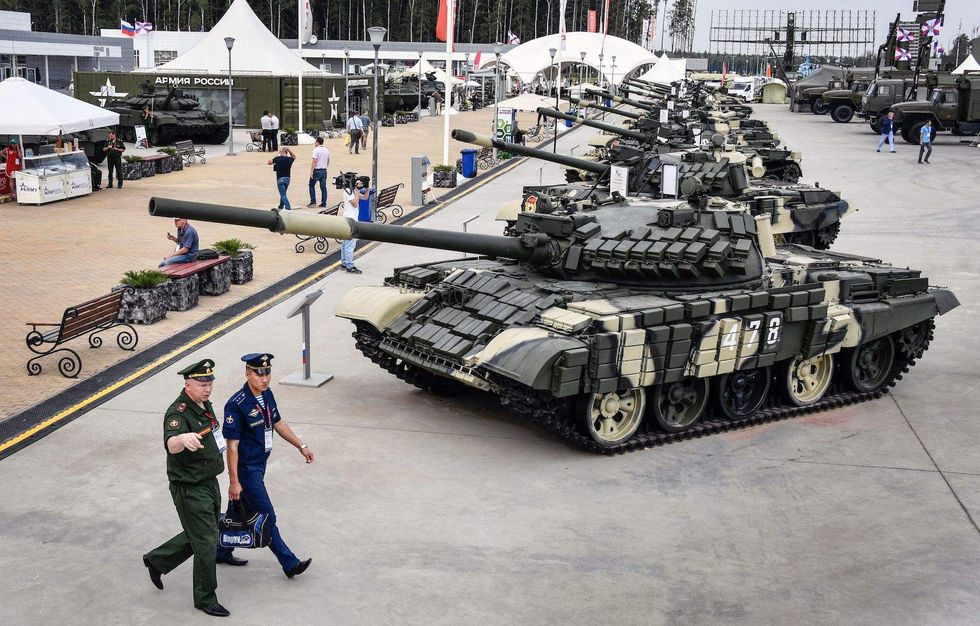
As Russia gears up for its "Zapad" war games, it is condemning the drills being held by the U.S. and South Korea in the Korean Peninsula as antagonistic. (Getty Images)

Russia and Belarus plan to engage in the "Zapad" war games on the border of Europe in September, prompting concerns from NATO allies. As Russia prepares these drills, it is simultaneously condemning the joint military drills being carried out on the Korean Peninsula by South Korea and the U.S.
CBS News reported Tuesday that Russia's "Zapad" — translated to "west" — games is raising concerns among NATO alliance members, including the Baltic states and Poland, who will see Russian troops massing near their borders.
According to CBS News, Russia's deputy defense minister, Lt. Gen. Alexander Fomin, said that foreign observers are invited to watch the drills unfold for themselves and dismissed Western "myths about the so-called Russian threat."
Fomin stated that the drills would "involve 5,500 Russian and 7,200 Belarusian troops, about 70 aircraft, 250 tanks and 200 artillery systems and 10 navy ships," CBS News said.
In February, Sen. Bob Menendez, (D-N.J.) told the Senate Foreign Relations Committee that the Belarusian people fear the Zapad war games could be an excuse to put 100,000 troops on their border. According to CBS News, this would be a massive increase in troops compared to games held 2013.
According to CBS News, though Russia claimed that only 10,000 troops took part in the 2013 Zapad games, some Western defense analysts believe it was closer to 70,000 troops.
U.S. Gen. Phillip Breedlove, former supreme commander of the NATO forces said in February that the notion of 100,000 troops being involved was alarming, CBS News reported, but he cautioned his allies that Russian leaders frequently spread misinformation to serve Russian interests.
Regardless, Breedlove believes a lot of signs pertaining to the games are worrisome. "Nations have a right to exercise," Breedlove said in February. "Nations do not have a right, I think, to exercise irresponsibly on other borders and in configurations that represent offensive capability."
"I think the problem with this exercise is size and scope, directly on the border, a name that orients it west, and the fact the unpredictability of it makes it very alarming," he said, according to CBS News.
The U.S. and South Korea have been conducting their annual drills on the Korean Peninsula in order to keep their respective militaries sharp in the face of the volatile communist North Korea.
On Tuesday morning, North Korea launched a missile over Japan that sailed over the island of Hokkaido. While this angered Japan and the U.S., Russia placed the blame for North Korea's missile launch on the joint U.S./South Korean military exercises.
“We consider the joint drills that went ahead anyway, albeit in a lighter mode compared to the initial agenda, made an impact in terms of provoking Pyongyang to make the new launch. We are highly concerned by the general developments,” Russian Deputy Foreign Minister Sergei Ryabkov said, according to Newsweek.
Additionally, Russia flew nuclear bombers around the Korean Peninsula on Aug. 23 as a warning to U.S. and South Korean forces
“The US and South Korea holding yet more large-scale military and naval exercises does not help reduce tensions on the Korean Peninsula,” Maria Zakharova, spokeswoman for the foreign ministry, said during a news briefing in Moscow. “We urge all sides to exercise maximum caution. Given the arms build-up in the region, any rash move or even an unintended incident could spark a military conflict.”
Russia appears to see reason in the amassment of troops along its western border for games that do little but upset their neighbors, but not in drills that serve to keep militaries prepared against a dangerous and unpredictable enemy.
The U.S. views the drills on the Korean Peninsula as necessary for the safety and peace of the region.
As Adm. Harry Harris, the commander of U.S. forces in the Pacific said of the joint U.S./South Korean drills, “a strong diplomatic effort backed by a strong military effort is key because credible combat power should be in support of diplomacy and not the other way around.”